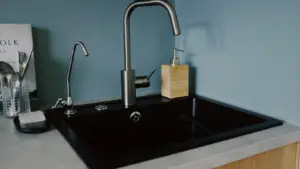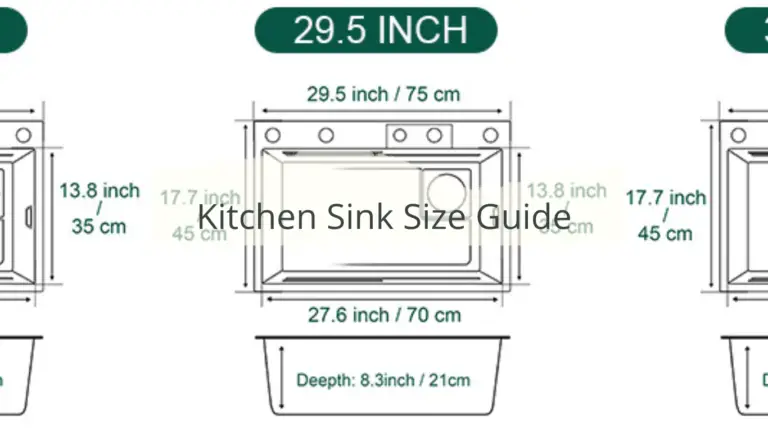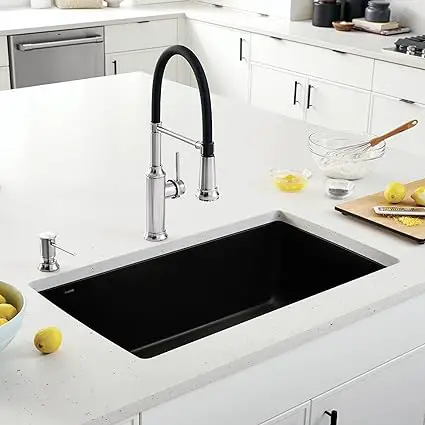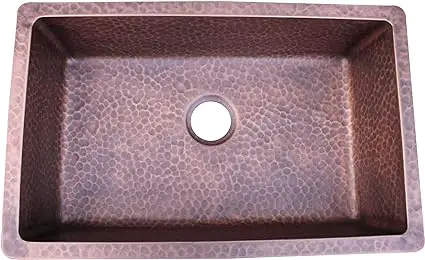How to Clean a Black Composite Kitchen Sink
This post may contain affiliate links which means I may receive a commission for purchases made through links.

Black kitchen sinks seem to be displacing white and stainless steel as the most popular color schemes for kitchen sinks. One reason for this is that black kitchen sinks are resistant to stains and messes, making them both elegant and classic. In addition, they require little effort to maintain and are extremely easy to clean, regardless of the material used to make them.
However, like any other surface, it’s important to clean your black kitchen sink regularly to keep it in good shape and shine. But how exactly do you do that?
In this article, I’ll show you how to clean a black composite kitchen sink, things to avoid, and what to use to avoid leaving scratch marks, darkening, and haze on your sink.
That said, let’s get right into it!
Things to avoid when cleaning a black composite kitchen sink
When cleaning a standard porcelain or stainless steel sink, you can use most regular cleaners to give your sink that shiny look again. However, black composite kitchen sinks require special treatment.
For instance, you should avoid harsh cleaning products as they can be too alkaline or acidic for the sensitive parts of the composite sink. Also, you should avoid abrasive scrubbers and limescale removers.
What to use when you clean a black composite kitchen sink
-
Dish soap
Spraying a little squirt of dish soap (washing up liquid) into a cloth does wonders when it comes to removing soap stains on a black kitchen sink. However, you should ensure that the dish soap does not contain enzymes or bleach as it might find its way into the sink surface.
-
White Vinegar
White vinegar is another great product for removing stains on black composite sinks. Better yet, white vinegar is cheap, readily available, eco-friendly, and doesn’t contain any harsh chemicals. Plus, if you do not like its smell, you can always use a few drops of essential oil to tackle the aroma.
More importantly, cleaning a black kitchen sink with vinegar is extremely simple. After all, you just need to put some white vinegar and water in a spray bottle in a mix ratio of 1:1, spray the solution all over the sink surface, and wipe it down with a microfiber cloth.
-
Mineral oil
Mineral oil, a by-product in the oil industry, is used for various purposes such as treating boards and seasoning pans. Interestingly, it can also be used to clean black kitchen sinks. Alternatively, you can apply a little oil to a microfiber cloth and use it to quickly wipe around the sink every 4 to 6 weeks.
-
Soda bicarbonate
Lastly, you can sprinkle some soda bicarbonate onto the black sink, leave it for about 30 seconds, and then wipe it down with a microfiber cloth. The bicarbonate will provide enough abrasiveness to get rid of any stains on the sink without scratching the surface.
How to clean a black kitchen sink
Step 1: Make sure your black sink is dry
Leaving water on your black composite sink can lead to limescale build-up, making it look dirty. Also, pools of water can decolorize the sleek black look of your sink, causing it to fade. Even worse, the limescale and hard water spots can scratch the sink surface, putting rough patches over it.
To avoid these problems, it’s important to ensure that you always keep your black sink dry. Luckily, you can easily accomplish this by draining out the water fully and wiping the surface dry after washing the dishes. However, you should avoid abrasive rags when drying the sink. Instead, use a soft damp microfiber cloth to avoid scratching the sink when getting rid of the lingering water.
Step 2: Clean the sink regularly
Cleaning your black sink regularly with a white vinegar solution is the easiest way to keep it looking shiny and clean. At the same time, this will prevent the accumulation of mineral deposits on the sink, which can potentially lead to discoloration.
With that in mind, add equal parts of vinegar and water to a bottle and spray the solution on the sink. Then use a clean and soft cloth to gently wipe down the sink surface in a circular motion, and dry it with a clean, dry cloth.
Step 3: Use dish soap to remove soap build-up
If you notice soap buildup, soap smudges, or dark spots on your sink after wiping it down with vinegar, use dish soap to remove them. However, as I mentioned earlier, you should ensure that the soap doesn’t contain any harmful chemicals or bleach.
If the dish soap is safe to use on black sinks, use it to dampen a rag and thoroughly wipe down any spots, before drying the surface with a soft clean dry cloth.
Step 4: Remove gunk, limescale & hard water spots
The safest way to get rid of limescale and hard water spots on black sinks is to use baking soda. Sprinkle the baking soda on the spots you want to clean, wait for 30 seconds, and rub it with a soft rug. Finally, rinse the entire kitchen sink with clean water and dry it with a clean & dry cloth.
Step 5: Brighten up your black kitchen sink
Over time, black composite sinks may start losing their brightness and shine. Fortunately, you can easily restore this shine by applying a small amount of mineral/ olive oil on the sink surface.
Specifically, apply a tablespoon of olive/ mineral oil to the surface of your kitchen sink and gently rub it with a soft piece of cloth. Repeat this procedure every 4 to 6 weeks to keep your black sink looking new at all times.
What if my black kitchen sink is scratched?
As already mentioned, you should always avoid abrasive cleaners when cleaning your black kitchen sink as they can scratch the surface. However, if you accidentally use such products on your sink, you can correct the problem by following these steps;
- Prepare a paste with baking soda and warm water
- Apply the paste to the scratched bits of your sink and leave it for about 12 hours
- Rinse the surface with clean water and dry it with a soft, clean cloth
- Finally, apply some mineral oil to the sink surface and buff it up until you get the desired shine.
Conclusion
The trend of black kitchen sinks doesn’t seem like it’s going to disappear anytime soon. Instead, these sinks are increasingly becoming more popular in recent years, despite their black, unconventional appearance. Luckily, as you’ve seen, they’re relatively easy to clean compared to other types of kitchen sinks. Even better, you can easily learn how to clean a black composite kitchen sink to maximize the aesthetic look of your kitchen space.







buy progesterone 100mg sale – order ponstel online cheap fertomid